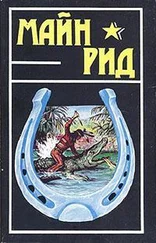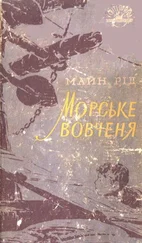In less than ten seconds the craft entered the embouchure of the gorge, gliding downward with the velocity of an arrow.
It was but a despairing effort on the part of its occupant to seize upon a tree that grew horizontally from the rocks; though in his despair Chakra clutched it. Even had the bush been firmly rooted, his strength would not have sustained him against the fierce, resistless flood.
But it was not. The roots gave way; and, in another instant, the Coromantee and his canoe were precipitated an hundred feet sheer among the black rocks below!
His confederate had preceded him only by two seconds of time; and the dead bodies of both came once more in close contact – circling round and round, amidst the frothy spume that creamed over the cauldron below!
Chapter 48
Conclusion
On the morning that succeeded the occurrence of these tragic events, one entering at the great gate of Mount Welcome estate, and directing his eye up the long, palm-shaded avenue, would have beheld but a mass of black, smoking ruins.
On any other morning, twelve months after, the eye of a person looking in the same direction, would have been gladdened by a sight far different. Smiling in all its splendour, at the end of that vegetable vista, once more could be seen the proud mansion of Mount Welcome – renaissant in every respect – its stone stairway still standing – its white walls and green-jalousied windows looking as if they had sprung, phoenix [595] -like, from the flames – every item of the architecture so closely in imitation of the former structure, that even the eye of an old acquaintance could have detected no trace of the transformation.
Outside, everything appeared as before. It was only upon entering the mansion that you might perceive a change, and this chiefly relating to its occupancy and ownership. Instead of a stout, red-faced, and somewhat plebeian personage, of over forty years old, you would see in the present proprietor of Mount Welcome a youth of noble mien, by age scarce claiming the privileges of manhood, but in aspect and demeanour evidently fit for the performance of its duties – deserving to be the master of that aristocratic mansion.
Near him – oh! certain to be near him – there is one upon whom the eye rests with still greater interest; one who had graced the old mansion – yet more gracing the new – the daughter of its former proprietor, the wife of its present one.
She has not even changed her name – only her condition. Lilly Quasheba is no longer Miss but Mrs Vaughan!
Both these personages may be seen seated in that great hall, with floor as smooth and furniture as resplendent as ever.
It is the hour after breakfast, and also, as of yore, the hour when the post may be expected. Not that either cared to look abroad for that diurnal messenger – more welcome to those around whom Hymen [596] has not yet wound his golden chain.
Equally indifferent were these two happy individuals to the actions of the outside world: neither cared for its news. Their love, still in the fresh flush of its honeymoon, was world enough for them; and what interest could either feel in the arrival of the mail?
But the post has no respect either for indifference or anxiety. It is transmitted alike to the grave and the gay. It brings joy to the heart heavy laden, and sorrow to that which the moment before its arrival may have been bounding with bliss.
In that great hall in the mansion of Mount Welcome there were two bosoms brimful of bliss, or a feeling near akin to it. Nay, why should we say akin to it, since they were two hearts in the enjoyment of a mutual love? If that be not bliss, there is no other – either on earth or in heaven.
Without any attempt at concealment, the eyes of both betrayed their mutual delight. Gazing on each other, in sweet reciprocal admiration, they saw not that dark form – rudely centaurean – that approached up the long avenue.
Had they seen it, it would have created no surprise. It was only the post-boy, Quashie, on his shaggy cob, returning from the Bay.
After this speculative peroration, the reader may be apprehensive of some dire development springing from the letter-bag slung over the shoulders of the darkey.
Nothing of the kind. There was a letter, but not one that might be unwelcome. But for the post-mark, it might have remained for hours unopened.
But the impress was peculiar. It was African. The letter was stamped with the name of a port near the mouth of the Gambia. It was addressed to “Herbert Vaughan, Esquire, Mount Welcome, Jamaica.”
The young planter broke the seal, and rapidly ran over the contents of the letter.
“From your brother, Cubina,” said he, though he knew that he imparted no information by this. “He writes to say he is coming back again to Jamaica.”
“Oh! I am so glad of that! I knew he would never live contented among those wild people, notwithstanding he has been made a prince over them; but Yola – ”
“She comes with him, of course. It is not likely he would leave her behind. She longs for her island-home again. I don’t wonder, dearest Kate. There is one spot on the earth hallowed beyond all others – the spot where heart meets heart in the free confession of a mutual love. No wonder the African maiden should desire to return to it. Human nature is everywhere the same. To me this Island is the elysium of earth!”
“Ah! to me also!”
On giving utterance to this mutual confession, the young husband and wife bent towards each other, and pressed lips as fervently as if they had never been married!
After this fond embrace, Herbert continued the reading of the letter.
“Oh!” exclaimed he, when he had perused another portion of the epistle; “your brother wants to know whether he can either become our tenant or purchase that piece of land that lies beyond the Jumbé Rock. The old king has given him a capital to start with, and he wants to turn coffee-planter.”
“I am glad he has such intentions. Then he will settle down, and be near us.”
“He must not be permitted to purchase it. We shall present it to him, since we have enough without it. What say you, Kate? It is yours, not mine to give.”
“Ah!” returned the young wife, in a tone of playful reproach, “do not distress me with those sad souvenirs . You know that I gave it to you when I might have believed myself its mistress; and – ”
“Stay, dearest. Do not you distress me by such an appeal! You were its rightful owner, and should have been. Even had we not become joint proprietors, I could never have thought of dispossessing you. Say, then, that the land shall be Cubina’s!”
A repetition of that sweet embrace pronounced the consent of both to the proposal of Cubina.
Herbert resumed the reading of the letter. “Good heavens!” cried he, on finishing its perusal, “what a singular story! The captain of the slaver, who brought Yola’s brother over to Jamaica, has been back again to the coast. What a terrible retaliation!”
“What, dear Herbert?”
“Only that they have eaten him !”
“Oh, merciful Father!”
“Sad and terrible though it be, it is true; else Cubina would not have written it. Hear what he says: —
“‘Jowler’ – that was the name of the slaver’s captain – ‘presented himself before old Foolah-foota, in search of a fresh cargo of slaves. The king, already apprised of the skipper’s treason to Cingües, instantly ordered him to be seized; and, without trial or other formality, caused him to be chopped to pieces upon the spot. He was afterwards cooked and eaten, at the grand national feast, which was held on the celebration of my nuptials with the princess Yola. Crambo ! it was a painful scene; and one might have felt sympathy for the unfortunate wretch, had he been anything else than a dealer in human flesh; but, under that reflection, I stood by without feeling any great desire to interfere in his behalf. In fact, my Fellatah father-in-law was so furious, I could not have saved the wretch from a fate which, after all, was perhaps not more than he deserved; and to which, no doubt, the poor victims he had carried across the Atlantic would have been only too glad to have seen him consigned.’”
Читать дальше
Конец ознакомительного отрывка
Купить книгу











